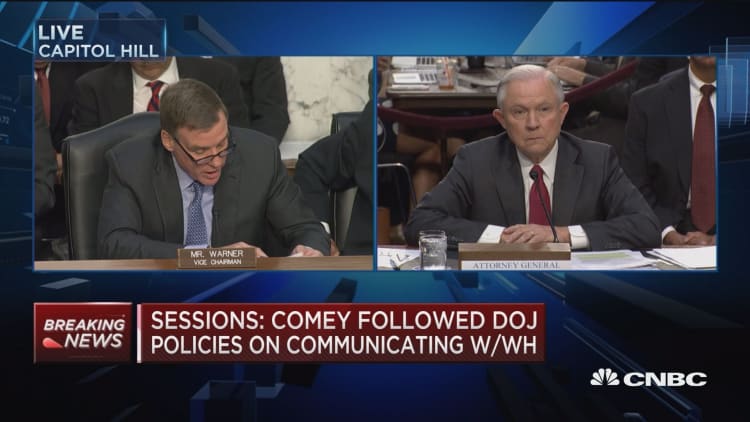Russian Ambassador Sergey Kislyak said on Wednesday that it would take him more than 20 minutes to name all of the Trump officials he's met with or spoken to on the phone.
"First, I'm never going to do that," he said. "And second, the list is so long that I'm not going to be able to go through it in 20 minutes."
Kislyak made the remarks in a sprawling interview with Russia-1, a popular state-owned Russian television channel. In the interview, which a Russian media expert said resembled "late night American television," he also joked about American investigations into Russian interference in the 2016 presidential election, called U.S. President Donald Trump "witty," and said that U.S.-Russian relations were worse than at any point since the end of the Cold War.
The interview followed a contentious day of testimony for Attorney General Jeff Sessions. Sessions was grilled by representatives on the House Judiciary Committee on Tuesday over whether he lied about meetings he had with Kislyak last year while he was a senator.
Sessions met twice with Kislyak last year, including once at the Republican National Convention and another time in Sessions' senate office, where the two reportedly discussed campaign-related matters.
Sessions, who was the first senator to endorse Trump's presidential bid, said during his confirmation hearing that he "did not have communications with the Russians."
Following reports that Sessions had met twice with Kislyak during the campaign, Sessions issued a letter to Congress saying his previous testimony had been "correct," but acknowledged the two incidents. He also recused himself "from any existing or future investigations of any matters related in any way to the campaigns for President of the United States."
Rep. Ted Lieu, D-Calif., asked Sessions on Tuesday how long his September meeting with Kislyak was.
"I doubt it was 50 minutes, but it may have been," Sessions said.
Asked whether Sessions was telling the truth, Kislyak demurred.
"I will tell you that in not one meeting, not with Sessions, not with anyone else, did we use any kinds of techniques or arguments that I would not be able to speak about publicly," Kislyak said.
He said Sessions's testimony gave him a feeling of déjà vu.
"The questions are all the same. There's absolutely nothing new. But most important, this is no longer about us," he said. "This is no longer about me. This isn't about contacts with us. This is a war that's going on between the opponents of the president, the president and everyone surrounding him."
George Mason University professor Eric Shiraev, who has written about Russia, international relations and political psychology, said Kislyak deliberately "made a mistake" by suggesting that American officials got in trouble for meeting with Russians, not for failing to disclose those meetings.
"It became almost comical," Shiraev said, noting that the audience was laughing throughout the taping. "He gave the impression that only because he met the American officials they got in trouble."
Kislyak told the interviewers that the idea that Russia "picked America's president" was "nonsense" and "very sad."
He said that relations started to grow toxic following a story in The Washington Post that reported on a conversation between Michael Flynn and Kislyak in which, the Post reported, the two discussed U.S. sanctions on Russia.
"I have a question," he said, regarding the Washington Post story. "So what?"
Flynn resigned as national security advisor four days after the story was published, saying he had given "incomplete information" regarding the phone call with Kislyak.
The White House and the Russian embassy did not respond to requests for comment.
Lizzy Gurdus contributed to this story.
WATCH: AG Sessions doesn't recall encounter with Kislyak



